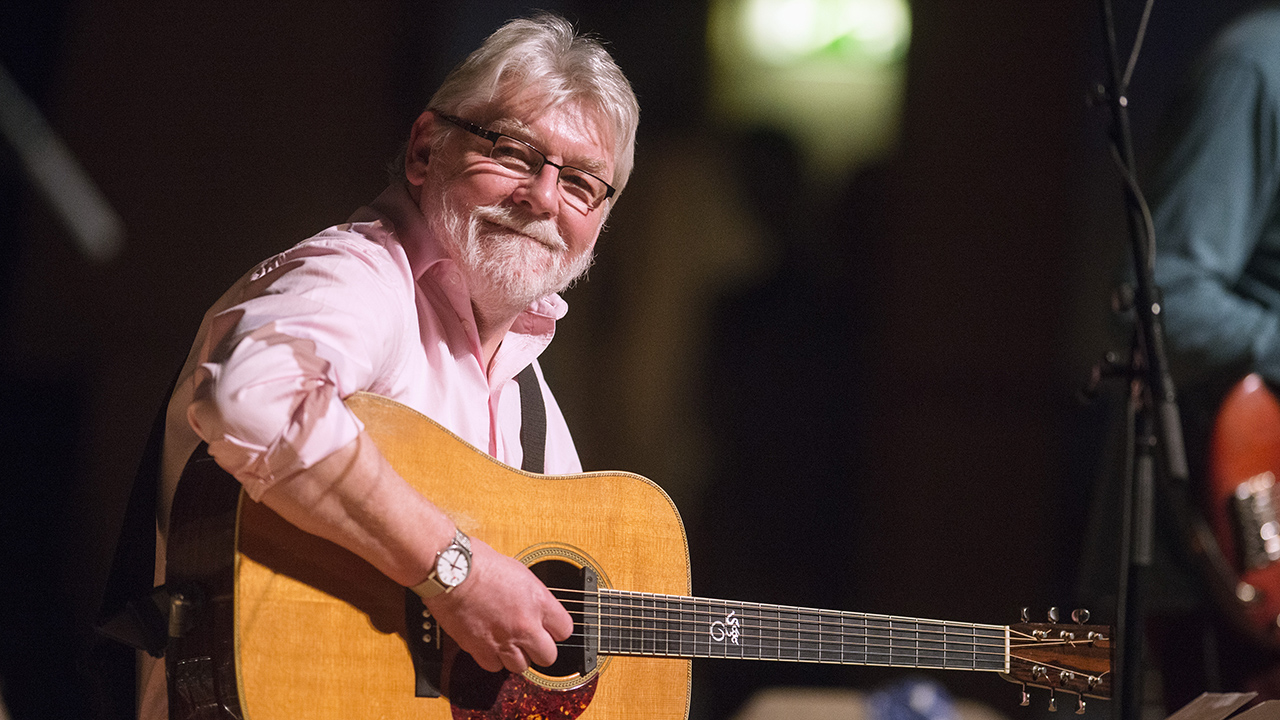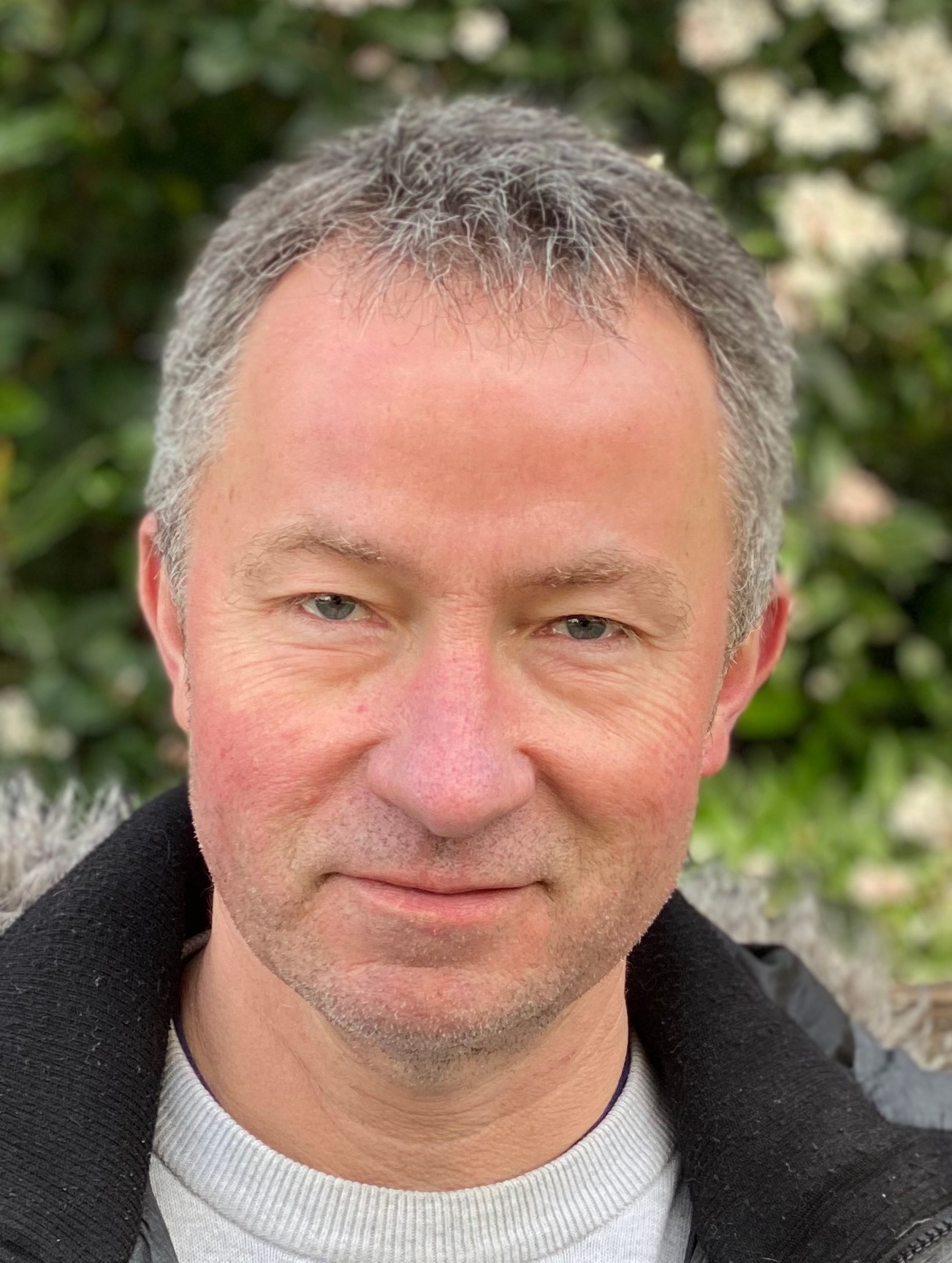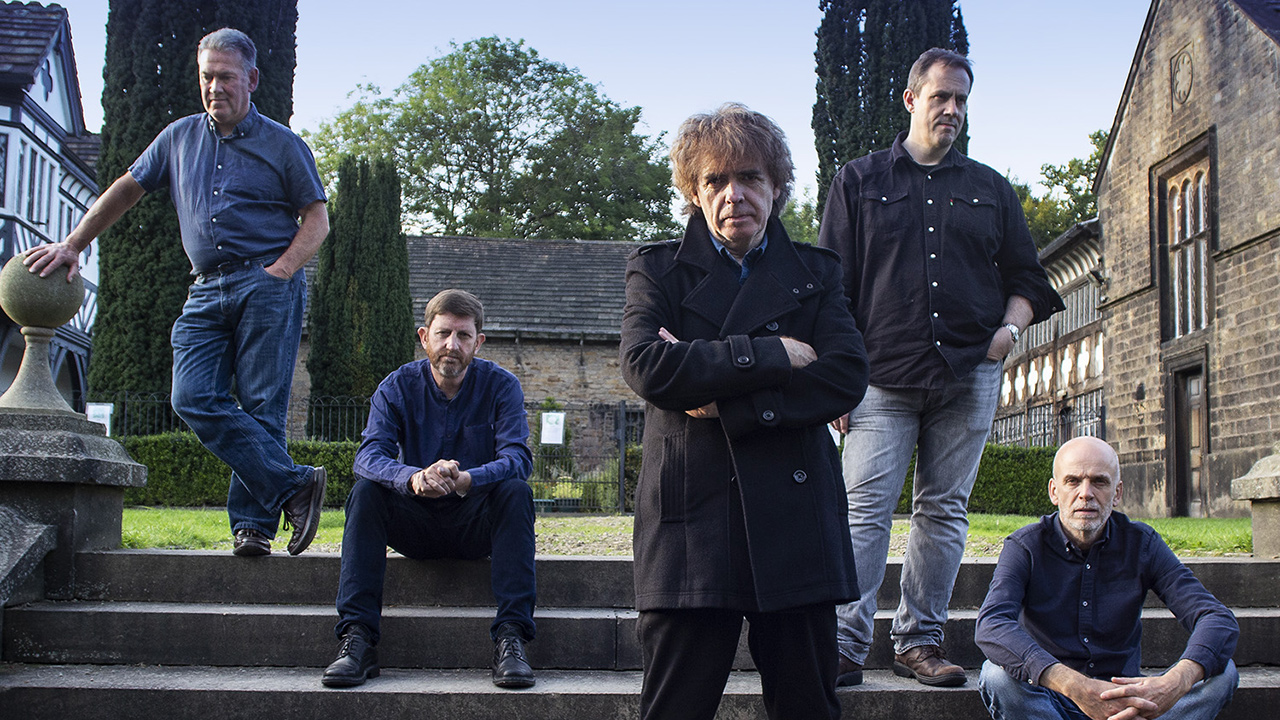“To me, it was like getting the car back on the road. The fact that we only managed to do about 10 shows before the wheels came off again was a bit of a slap from the gods”: Despite the challenges, Fairport Convention never gave up
Simon Nicol reflects on how the pioneers of British folk prog wound up taking a career path rather than a short cut to temporary commercial success

Along with Richard Thompson, Ashley Hutchings and Shaun Frater, guitarist Simon Nicol formed Fairport Convention in 1967, and he’s the only original member in the current line-up. In 2020 – marking the release of 39th album Shuffle And Go – he told Prog about the band’s humble beginnings, their role as musical pioneers and their enduring Cropredy summer festival.
Gazing in admiration at Fairport’s London show at Union Chapel, it felt like a measure of your pride in Shuffle And Go that the new album was so extensively showcased.
The feeling on stage, and the freshness, means that we managed to put 10 new songs in the set. Albeit two of them have been mainstays for 18 months or so – Shuffle And Go and Moon Dust And Solitude. They’d established themselves very firmly in the repertoire before we got around to recording them, but others like Cider Rain we’d never performed.
Do you make records differently these days?
The way you layer it up, everybody’s individual contribution to the total end sound is developed in the studio, rather than having a fixed arrangement you then go in and record. There are many ways of recording now that were not possible when I started. You had to have a routine performance that you tried to capture.
It also says a lot that your setlist can be flexible enough to take in so many new tunes.
Playing the new album – and the fact that Full House is 50 years old and we wanted to recognise that fact – meant that we did have to shoulder aside a lot of the core repertoire. But I didn’t miss those songs, like Crazy Man Michael. Obviously we have to do Matty Groves, and Walk Awhile, but fortunately that’s on Full House anyway. It’s good for songs to have a lie down for a while. But now we’re spoiled for riches.
Sign up below to get the latest from Prog, plus exclusive special offers, direct to your inbox!
A Fairport show these days has such a comfortable assurance about it. I suppose that’s just experience?
Whatever I did for a living now – being a pensioner of some years’ standing and having done this since I was a schoolboy, effectively – I would hope that whatever career path I’d gone down, I was better at it now than I was when I started.
You’re also able to write extensively within the group – notably with Chris Leslie’s five compositions on Shuffle And Go – but take songs from outside too.
It’s things that appeal to us for their inherent melodic and lyrical content. That’s why I never became a writer. I never had the interest in working out those first thousand cliché-ridden rubbish songs, which you actually have to toil through. I’d rather allow myself to be a conduit.
You did do some songwriting in the early years, though.
Yeah, just enough songwriting to realise how rubbish it was and to realise the size of the obstacle. Hats off to Richard Thompson, obviously a case in point. But to a lesser extent,I’ve seen Chris’ songwriting develop in the 23 years he’s been in the band. The stuff he’s coming out with now, nobody else could write it. It’s got his stamp all over it. He’s developed a really good strong style, with his own voice.
But Richard just continues to amaze and astonish me. His powers are still growing in every area, and his singing is now something else. It’s been through many incarnations, the same way my voice has changed, but his writing constantly sets you back on your heels.
There’s a feeling in the show that you always want to honour former bandmates.
Yeah, well, standing on the shoulders of giants, here we are. Nobody gets out of Fairport alive! We’re very, very close as ex-colleagues. Even people like Iain Matthews, who left the band after such a brief period. He’s saddled with that ‘ex-Fairporter’ tag whenever you read an article about him, and his career’s been through so many different things.
Is there a feeling of responsibility to honour the memory of Sandy Denny when you do Who Knows Where The Time Goes?
There is, yes, because it doesn’t just mean a lot to a lot of people – it means more every time I sing it and people hear it. It’s a simple truth, and you can’t over-tell it. It’s a joy to do, and when it’s pin-drop, and there’s a little pause at the end before people start clapping, that’s a magic moment in any performance. You know she’d be proud.
What is it you think of when you think of Sandy?
You remember – not a loose cannon, that’s a pejorative description – but she was not the most organised and joined-up of people. We were forever mopping up after her. But life goes on. Did you see Georgia last year when she was over? [Georgia Lucas, Sandy’s daughter with Trevor Lucas, wrote a moving poem to her late mum, which was read at Cropredy].
She came over for the first time in a very long time, on her own. Her spirit is a testament. She’s been through tragic times, but she’s such a good person now. She was full of doubts about the way she’d be received at Cropredy, not just by those who knew and loved her mum and dad, but by the greater community of people who never met Sandy and had her on their own particular pedestal. She went home totally refreshed by it.
Let’s wind the clock right back. How did you get started?
When I was about 14, I came to Ashley’s attention. He’s five years older than I am, and he was the guy who ran the bands that played at my youth club. Whenever there was a band on the Friday night youth club, probably every three or four weeks, it’d generally be him playing the bass and doing the introductions.
How did you bond with him, musically?
He was somebody with a much broader reach than I had. He was particularly into, I suppose, urban blues. I was aware of Sonny Terry and Brownie McGhee, Big Bill Broonzy, all of that, but he was more into the Chicago stuff – if you’re an electric bass player, that’s more up your street.
There are definitely people that chase the spotlight around the stage, but we need all sorts. Who wants a band full of frontmen?
But in other areas, I think we probably shared common language musically. We were in harness together pretty quickly, because I had a 12-string guitar, which was my point of value to him. He didn’t know anybody else in north London that was recruitable, and there was a point where that was a fashionable instrument, so it was a good tool to have in the arsenal.
Did you ever have any ambitions to be a lead guitarist?
No, I never even learned a Hank Marvin top line. I don’t know why, it was just the potential for things going wrong was too forbidding. But playing rhythm guitar I enjoyed as soon as Ashley put me in that role. There are definitely people that chase the spotlight around the stage, but we need all sorts. Who wants a band full of frontmen?
How did you come to meet Richard Thompson?
Ashley’s neighbour Brian, who was a very good friend of mine, was at school with Richard, in the same class. He was always banging on about his classmate who was a really good guitarist.
Richard came from up country, he was from Totteridge, for Heaven’s sake. Shockingly distant, more than three stops on the Northern Line! So Richard did at one point dep for somebody in one of Ashley’s bands, and it worked out really well, and we carried on. Then it became more focused on the three of us to select the material and relax into being in a band together.
You rehearsed above your doctor father’s surgery, didn’t you?
Yeah, it was just a conveniently large place. The family had moved out at that point and moved 50 yards up the road. My dad had got ill, but the practice continued and my mother and he were responsible for paying the rent.
It was Dad’s place of work. As a senior partner, he was responsible for financing it all. They ended up renting it out on a room by room basis, so it was easy for me to claim the living room, by which time Ashley was in one of the rooms.
Can you remember when you actually became Fairport Convention?
That period in hindsight does seem quite compressed to me. I can’t salami-slice it into events and who was doing what, when. But pretty soon we had an outfit that was calling itself Fairport Convention.
I remember who came up with the name – it was Richard Lewis, who’s still a pal. I saw him on this tour. He’s a retired head teacher now, in West Yorkshire. He was one of my little gang of close friends with Brian and John Penhallow, who undertook the management role and tried to get us gigs. He promoted the first gig and printed the posters and went round sticking them on trees and stuff, trying to get an audience. Took out adverts in the Melody Maker, all that stuff. He introduced us eventually to an agency.
It always seems as though you gained a wider profile quite quickly.
It was very quick. The business was a cartel – a few agents, a few labels, and you were in that world, or you were outside it. But we did accelerate. There was no one reason why things happened; it was an accident of timing.
We did our first gig as Fairport in May ’67. We got a gig at UFO Club having knocked on the door before – we got one within six weeks of taking the name. Joe Boyd caught the band; we were signed up within 10 days to him as a personal management thing and he was record producer.
He introduced us to, initially, Polydor Records. That was when the switch was thrown and we stopped being amateurs to become waged professionals. Literally the blink of an eye – weeks not months.
Here comes the inevitable Liege & Lief question. You made the record in the wake of the terrible motor accident that killed drummer Martin Lamble. It’s become the poster album of progressive folk, but how was it received at the time?
I remember the warmth and affection that the band had come back from this dreadful event. The record was challenging for some people, and heartily approved of by others. I never heard one really negative comment about it.
But I remember it as a brilliant period for reconstruction as much as innovation. To me, it was primarily getting the car out of the ditch and back on the road. The fact that we only managed to do about 10 shows before the wheels came off again was a little bit of a slap from the gods.
With hindsight, I can see it was almost inevitable that somebody was going to snap. The fact that it was Sandy [who left] and then that triggered Ashley [to leave too] – hey, again, it just shows that, sadly, the graveyards are full of indispensable people. But somehow or other you find a way to sit back, reassess, rebuild.
That’s happened to this band so many times.
We’ve muddled through. It’s not some masterplan; nobody’s got a crystal ball. You believe that the best is yet to come and the future’s a blank page on which we choose to write.
When you yourself left the group the first time in 1971, you were still so young.
Yes, 16 when the band took their name, just past 21 when I left. At the time, it was a quarter of my life. We’d had two years with Peggy [Dave Pegg] and Richard, and then Richard left halfway through that period. We became a four-piece and that worked fine too.
But I had confidence that something would come along, and I wanted to get off that particular treadmill, and spend a bit more time at home. I suppose I was just a bit road-weary. ‘I bought a house – why don’t I live in it?’ It wasn’t long before the phone rang and Ashley was asking if I wanted to be involved in a totally different project, The Albion Band, and away we went.
But as always in the Fairport family, no one burned any bridges, did they?
I kept in touch with the boys, because they were my best mates: Peggy and Swarb [Dave Swarbrick]. There was a lot of cross-fertilisation going on, and that led ultimately to me rejoining in a very natural way. Not rejoining – being re-absorbed is a better way of putting it.
It really is like family now.
You share a lot of intangibles. You have to be really bonded.
The annual Cropredy festival has become this marvellous focal point of your year, like an annual general meeting of like minds. But it had very modest beginnings, didn’t it?
In the very first days, it was the aftermath of a village fête. Peggy and Swarb lived in Cropredy; Peggy’s kids went to the village school, and we borrowed the village hall for rehearsals. They just said, ‘We’ve got the fête next week, would you lot like to play after we’ve packed it all up?’ And that was the first one; that was about ’76.
On the winter tour you get a lot of people who are growing old with us. The festivals are quite unlike that. There’s no average person at Cropredy. Just look at the car park
By the time that had happened twice, it had outgrown the village and Peggy and [then wife] Christine started running it. Then the year after that it became time to say farewell. So we were already running it as an independent one-day event and that was our farewell gig.
The next year, ‘Well, shall we just see what happens if we put on a reunion?’ And we had more people come to that, so that was when the snowball began to roll.
Is there anything like an average Fairport fan these days?
There’s a lot of grey hair. A lot of retirees. There’s nothing wrong with the grey pound. Usually when you’re with those people, there’s a lot of nostalgia in the room, a lot of ‘I remember when you played my university...’ They’re not all like that, but certainly on the winter tour, you get a lot of people who are growing old with us. The festivals are quite unlike that. There’s no average person at Cropredy. Just look at the car park.
Is there a benefit in longevity over short-term gain?
When you have commercial success and it’s of an era, then I’m afraid it puts a dome over you. You become a prisoner of that time, and that’s what people invest in when they buy a ticket – they want to see that. That’s the best thing about having failed to make any inroads into the commercial world.
We have not troubled the accountants. Tickled the charts, only on one occasion, really. Angel Delight got into single figures in the album chart in 1971, but other than that...
The music business has not just changed in the 53 years I’ve been making a living out of it. It’s changed completely about every seven years. It keeps doing that, I think basically because it’s a young person’s game, and young people want their own version of things.
But here you still are.
Fortunately – again, everything’s fortunate, Sliding Doors moments – we took the right fork in life, not to commercial success or any kind of adulation, but to a career path, which is undeniable now. I’m not looking for another job, it’s official. It’s still a hobby, but my life is full of appreciation.
It’s not been without collateral damage and some poor choices, but they’ve been overwhelmingly outweighed by the good fortune that has resulted. You don’t know, when you choose between two paths, that ‘this is definitely the way.’
But we’re still here, we’ve made a great record that’s got some real meat on it – you can’t say that about every studio album we’ve made – and people love what we’re doing.
Prog Magazine contributor Paul Sexton is a London-based journalist, broadcaster and author who started writing for the national UK music press while still at school in 1977. He has written for all of the British quality press, most regularly for The Times and Sunday Times, as well as for Radio Times, Billboard, Music Week and many others. Sexton has made countless documentaries and shows for BBC Radio 2 and inflight programming for such airlines as Virgin Atlantic and Cathay Pacific. He contributes to Universal's uDiscoverMusic site and has compiled numerous sleeve notes for the Rolling Stones, Eric Clapton and other major artists. He is the author of Prince: A Portrait of the Artist in Memories & Memorabilia and, in rare moments away from music, supports his local Sutton United FC and, inexplicably, Crewe Alexandra FC.

